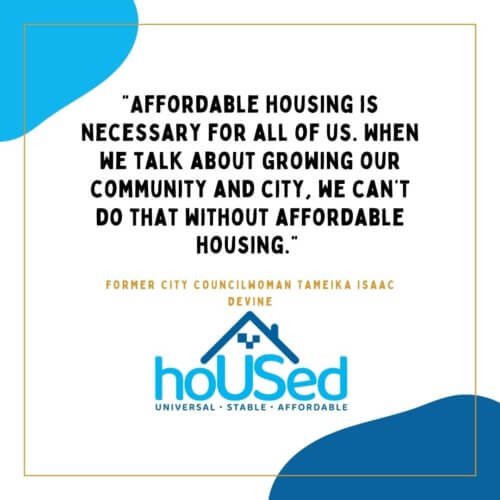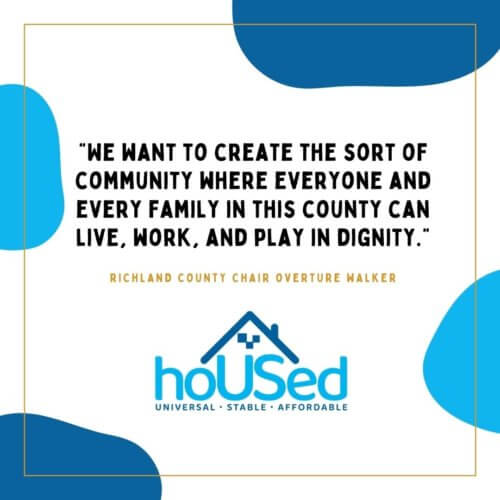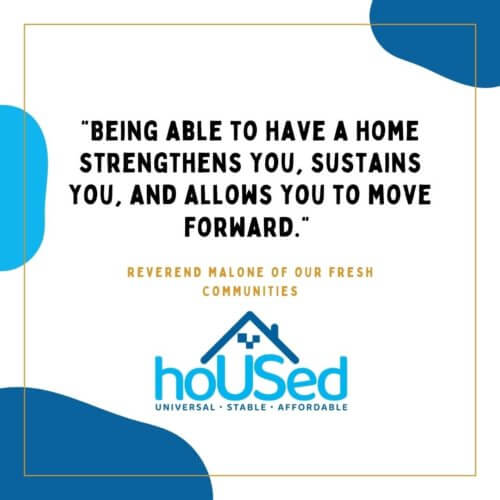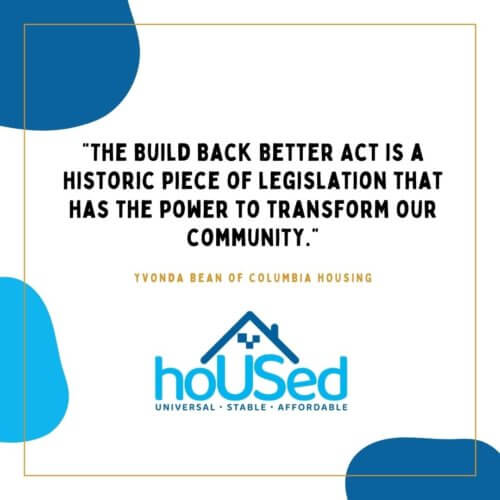HoUsed Campaign: South Carolina

What is the HoUSed Campaign?
The HoUSed campaign is a nationwide initiative led by the National Low Income Housing Coalition (NLIHC) to ensure that low-income and marginalized groups have access to stable, affordable housing. SC Appleseed is proud to partner with this campaign to advance the policies, reform, and legislation necessary to find long-term solutions to the affordable housing crisis.
What is the Affordable Housing Crisis?
The affordable housing crisis can be summed up by two problems: a widespread shortage of affordable rental homes and low wages in the face of high rental costs nationwide.
There is a Severe Shortage of Affordable Rental Homes Across the Country for Extremely Low Income Households
10.8 million of the nation’s 44 million renter households are classified as having extremely low incomes (defined as 0-30% of the area’s median income). Nationally, “the U.S. has a shortage of 7.8 million rental homes affordable and available to extremely low-income renters, whose household incomes are at or below the poverty guideline or 30% of their area median income,” per NLIHC. Only 46 affordable homes exist for every 100 extremely low-income renter households in South Carolina.
Of those extremely low-income renter households, 46% are seniors or disabled. Another 44% are in the work force, in school, or are single-adult caregivers.
The nearly 11 million extremely low income renter households account for 25% of all renter households, or 9% of all total households in the US. This substantial group of our country’s population is struggling on a daily basis to find affordable housing for their families. Learn more about the affordable housing shortage here.

The Gap Between Low Wages and High Rent
In the face of rising rental costs and stagnating wages, many families are struggling to afford rent even if they are working full time or working multiple jobs. The National Low Income Housing Coalition estimates that nationally, an hourly wage of $24.90 is needed to afford a modest two-bedroom rental home or an hourly wage of $20.40 is needed to afford a modest one-bedroom rental home.
The federal minimum wage of $7.25 falls well below both estimates. The federal minimum wage does not automatically rise with inflation and if it had increased at rate of productivity growth over the past few decades, it would be $21 in 2021. Even in states with higher minimum wages, many workers would still have to work extremely long hours to be able to comfortably afford rent, leaving no time for sleep, cooking, and caring for family members.
A Look at South Carolina’s Affordable Housing Crisis
Housing Shortage: In South Carolina, there are 159,862 extremely low-income renter households. 71% of those households face a severe cost burden, meaning they spend more than half of their income on housing. There are only 46 affordable and available rental homes for every 100 extremely low-income renter households in the state. Overall, there is a deficit of 74,291 affordable and available rental units for extremely low-income households in SC. Learn more about the shortage in SC here.
Wage Crisis: The state minimum wage in SC is $7.25 and the average renter wage in the state is $13.97. In order to afford a modest 2-bedroom rental home at fair market rent, you would need an hourly wage of $18.08.
At the state minimum wage, you would have to work 86 hours a week to afford a modest 1-bedroom rental home at fair market rent. Fair market rent for a 1-bedroom rental home is $806/month, but a minimum wage worker in SC needs rent to be $377/month in order to be affordable (defined as the worker spending 30% or less of their income on housing). Learn more about SC’s wage crisis here.

Why Should We Care About the Affordable Housing Crisis?
Housing is linked to nearly every measure of having a quality life: education, health, economic mobility, racial equity and more. Nationally, racial disparities are clearly evident in the affordable housing crisis. Black, Latino, Native American, and Asian households are more likely than white households to be classified as extremely low-income renters.
South Carolina has a large proportion of minority and low-income groups that are disproportionately affected by this crisis. In South Carolina, 27% of the state identifies as black. This is a large part of our population that is particularly vulnerable to the effects of the affordable housing crisis.
Nationally, 20% of black households are classified as extremely low-income, meaning they are more likely to face the shortage in supply of available and affordable housing. Similarly, the median black worker earns 24% less than the median white worker. Black workers are also more likely to be employed in sectors with lower median wages. These factors mean that over a quarter of South Carolina’s population is especially vulnerable to the affordable housing crisis.
What are the goals of the HoUSed campaign?
- Bridge the gap between income and housing costs through rental assistance
Rental assistance needs to be extended to every eligible household. Currently, only 1 in 4 eligible households receive rental assistance. Bridging this gap could eliminate the need for families to choose between paying the rent or putting food on the table. Learn about why we need universal rental assistance here.
- Preserving and increasing the supply of affordable and accessible housing
As discussed above, there is currently nowhere in America that has a big enough supply of affordable housing for low-income families. We need to increase the housing trust fund to build and preserve homes for low-income families. We also need to invest in our nation’s public housing infrastructure and guarantee full funding for public housing in the future. Learn more about how we can expand the supply of affordable housing for low-income families here.
- Create a national housing stabilization fund to provide emergency rental assistance to households in crisis
Many households are just a paycheck away from experiencing homelessness. Emergency rental assistance can provide economic stability during times of financial hardship to prevent families from experiencing homelessness. Creating a national housing stabilization fund would provide emergency assistance to families to bridge the gap between income and rent. Learn more about the potential benefits of a national housing stabilization fund here.
- Strengthen and enforce renter protections
The power imbalance between renters and landlords put renters at risk of housing instability and homelessness. Establishing more robust renter protections could improve racial inequity, lessen the risk of harassment and evictions for renters, improve renter access to legal counsel, and much more. Learn more about what legislation Congress should enact in order to develop stronger renter protections here.
How can Budget Reconciliation Provide Long-Term Solutions to the Affordable Housing Crisis?
Through Budget Reconciliation, the government can invest $150 billion into affordable housing and will provide much needed aid to many of the issues associated with the housing crisis. The budget discussion aligns with many of the HoUSed campaigns’ priorities and does the following:
- Expands rental assistance by $25 billion. The bill also includes funding for tenant protection vouchers, mobility services and landlord outreach.
- Provides $65 billion to preserve public housing for future generations. Public housing is key to providing affordable and accessible housing to low-income families.
- Includes $15 billion for the national Housing Trust Fund. This has the potential to build or preserve more than 150,000 rental homes affordable to households with extremely low incomes.
- Other important investments include: $3 billion for a Community Restoration and Revitalization Fund, $2 billion for rural housing, $1.75 billion to address zoning barriers to affordable housing, and more.
- Learn more about the important housing investments in discussion here.

How Could South Carolina Benefit from the Budget Reconciliation and Other Affordable Housing Initiatives?
As the numbers show, South Carolina is suffering from the effects of the housing crisis. Our low-income and most vulnerable groups of workers are often a paycheck or two away from experiencing homelessness. Budget Reconciliation would invest in SC’s public housing infrastructure, provide much needed rental assistance to the thousands of households struggling in our state, and more. SC Appleseed is proud to stand with the HoUSed campaign and support the budget’s historic investments in South Carolina’s housing.
Hear South Carolina Stories
Visit the following stories featuring advocates and community members to learn more the housing challenges that South Carolinians face.
The Rainy Day Fund: How Small Changes Can Make Big Differences
Take Action
You can take action TODAY to help support better investments in housing for South Carolina! Use the following tools from the National Low Income Housing Coalition to send a message to state leaders about the importance of housing.
Click here to send your support Budget Reconciliation.
Click here to send your support for the 2022 fiscal package which supports more than $4 billion above FY21.
Interested in sharing your story about housing? Email us at [email protected].

